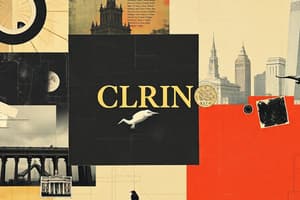Podcast
Questions and Answers
What characteristic makes intangible resources more valuable compared to tangible resources?
What characteristic makes intangible resources more valuable compared to tangible resources?
- They can be easily quantified.
- They are difficult to imitate. (correct)
- They can be seen and touched.
- They include physical assets.
Which question assesses whether a resource or capability is unique?
Which question assesses whether a resource or capability is unique?
- Can the resource generate income immediately?
- Is the organization effectively utilizing its resources?
- Is the resource or capability easily replicated?
- Is the resource or capability unique? (correct)
Which type of resources tends to be easier to imitate?
Which type of resources tends to be easier to imitate?
- Intangible resources
- Tangible resources (correct)
- Knowledge resources
- Human resources
When assessing a capability, which of the following questions indicates awareness and realization of advantages?
When assessing a capability, which of the following questions indicates awareness and realization of advantages?
What is the primary focus of assessing the availability of substitutes for a resource or capability?
What is the primary focus of assessing the availability of substitutes for a resource or capability?
What is the primary role of the board of directors in a corporate ownership structure?
What is the primary role of the board of directors in a corporate ownership structure?
What is a common example of an agency problem?
What is a common example of an agency problem?
What can lead to entrenchment in management?
What can lead to entrenchment in management?
Which of the following is a benefit of having a high percentage of outsiders on a board?
Which of the following is a benefit of having a high percentage of outsiders on a board?
How does a CEO duality situation potentially create issues within an organization?
How does a CEO duality situation potentially create issues within an organization?
What does the Current Ratio measure?
What does the Current Ratio measure?
Which ratio indicates the extent to which stockholders’ investments are leveraged?
Which ratio indicates the extent to which stockholders’ investments are leveraged?
The formula for Inventory Turnover is based on which two key components?
The formula for Inventory Turnover is based on which two key components?
What approach involves the CEO formulating the strategy while also planning for changes in structure and personnel?
What approach involves the CEO formulating the strategy while also planning for changes in structure and personnel?
What does the Quick Ratio assess?
What does the Quick Ratio assess?
The Average Collection Period is used to measure what aspect of a company’s operations?
The Average Collection Period is used to measure what aspect of a company’s operations?
Which leadership approach involves the CEO and top management team creating both the vision and the strategy?
Which leadership approach involves the CEO and top management team creating both the vision and the strategy?
Which financial ratio indicates the percentage of assets financed through borrowing?
Which financial ratio indicates the percentage of assets financed through borrowing?
What is a key characteristic of the 'Builder' culture?
What is a key characteristic of the 'Builder' culture?
Which type of knowledge is most difficult to articulate meaningfully?
Which type of knowledge is most difficult to articulate meaningfully?
What negative culture can arise from a focus on quality in the 'Craftsmen' culture?
What negative culture can arise from a focus on quality in the 'Craftsmen' culture?
What should organizations develop to encourage innovative thinking?
What should organizations develop to encourage innovative thinking?
What is the consequence of a company overly emphasizing marketing, according to the 'Salesman' culture?
What is the consequence of a company overly emphasizing marketing, according to the 'Salesman' culture?
What is 'integrative knowledge' primarily associated with?
What is 'integrative knowledge' primarily associated with?
Which of the following is a task associated with knowledge retention?
Which of the following is a task associated with knowledge retention?
What is the primary negative outcome of the 'Pioneer' culture when it becomes careless?
What is the primary negative outcome of the 'Pioneer' culture when it becomes careless?
Which practice is associated with enhanced productivity in capital-intensive industries?
Which practice is associated with enhanced productivity in capital-intensive industries?
What is a primary benefit of employee stock ownership plans (ESOPs)?
What is a primary benefit of employee stock ownership plans (ESOPs)?
Which factor does NOT typically influence organizational culture?
Which factor does NOT typically influence organizational culture?
What does conflict tolerance in an organization refer to?
What does conflict tolerance in an organization refer to?
How can organizational structure improve performance?
How can organizational structure improve performance?
What is one effect of high performance work practices?
What is one effect of high performance work practices?
What is a characteristic of decentralized organizations?
What is a characteristic of decentralized organizations?
Which aspect of organizational culture encourages risk-taking?
Which aspect of organizational culture encourages risk-taking?
Flashcards are hidden until you start studying
Study Notes
Firm Resources and Capabilities
- Resources and capabilities can provide value in the market and contribute to competitive advantage.
- Unique resources or capabilities are more likely to offer sustained competitive benefits.
- Substitutes for resources or capabilities can impact their value; ready availability may diminish competitive edge.
- Organizations must be aware of their resources and capabilities to effectively realize their potential.
Types of Resources
-
Tangible Resources
- Observable and measurable, like manufacturing processes and physical products.
- Generally easier to replicate by competitors.
-
Intangible Resources
- Difficult to quantify, including skills, knowledge, and stakeholder relationships.
- Harder to imitate, often contributing to long-term competitive advantages.
Financial Ratios
-
Liquidity Ratios
- Current Ratio and Quick Ratio measure a firm’s ability to meet short-term obligations.
-
Leverage Ratios
- Debt to Equity and Debt Ratio assess the degree of financial leverage and the extent of asset financing through debt.
-
Activity Ratios
- Asset Turnover and Inventory Turnover evaluate the efficiency of using assets and managing inventories.
Strategic Leadership
- Leaders should create a compelling vision of the future and communicate it effectively to empower employees.
- Establish core values to shape organizational culture and behavior.
- Encourage a learning environment where questioning and innovation are promoted.
Leadership Approaches
- Various styles include:
- Commander: CEO-driven strategy execution.
- Change: Includes restructuring for strategic alignment.
- Collaborative: Group involvement in strategic planning.
- Cultural: Leadership molds supportive organizational culture.
- Crescive: Encouragement of innovation among lower-level managers.
Corporate Ownership Structure
- Individual shareholders elect a Board of Directors to monitor and control management for shareholder interests.
- The board includes both insiders who understand internal operations and outsiders who provide fresh perspectives.
Agency Theory
- Managers (agents) should prioritize owners' interests but may act in their self-interest, creating potential conflicts.
- Entrenchment occurs when managers gain excessive power, leading to self-serving actions.
Effective Boards
- Active boards protect shareholder interests and advise management.
- A high proportion of outsiders on a board promotes independence and diverse insights.
Employee Management
- Well-managed employees are essential for competitive advantage, particularly through sophisticated HR practices.
- High-performance environments lower turnover and boost productivity, involving employees in decision-making.
Organizational Structure and Culture
- Structure influences performance through defined roles and responsibilities; some organizations are adopting modular structures for flexibility.
- Culture encompasses shared values and influences attitudes toward customers, competitors, and risk.
Knowledge Economy
- Knowledge is an intangible, vital asset in modern business.
- Core knowledge relates to product/service creation, while integrative knowledge connects various activities within the organization.
- Codified knowledge is documented and easily communicated; tacit knowledge is personal and harder to articulate, making it valuable.
Internal Knowledge Management
- Develop systems to foster innovation and encourage knowledge sharing across the organization.
- Knowledge retention involves documenting research, ideas, and responses to promote informed decision-making.
Studying That Suits You
Use AI to generate personalized quizzes and flashcards to suit your learning preferences.




